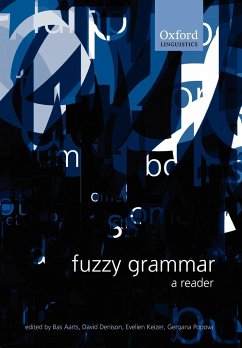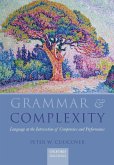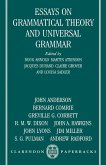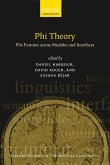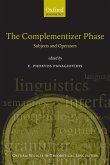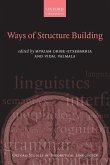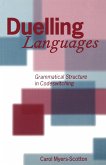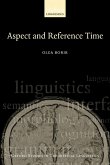Bas Aarts / David Denison / Evelien Keizer / Gergana PopovaA Reader
Fuzzy Grammar
A Reader
Herausgeber: Denison, David; Popova, Gergana; Keizer, Evelien
Bas Aarts / David Denison / Evelien Keizer / Gergana PopovaA Reader
Fuzzy Grammar
A Reader
Herausgeber: Denison, David; Popova, Gergana; Keizer, Evelien
- Broschiertes Buch
- Merkliste
- Auf die Merkliste
- Bewerten Bewerten
- Teilen
- Produkt teilen
- Produkterinnerung
- Produkterinnerung
This book brings together classic and recent papers in the philosophical and linguistic analysis of fuzzy grammar, gradience in meaning, word classes, and syntax. Issues such as how many grains make a heap, when a puddle becomes a pond, and so forth, have occupied thinkers since Aristotle and over the last two decades been the subject of increasing interest among linguists as well as in fields such as artificial intelligence and computational linguistics. The work is designed to be of use to students in all these fields. It has a substantial introduction, is divided into thematic parts,…mehr
Andere Kunden interessierten sich auch für
![Grammar and Complexity Grammar and Complexity]() Peter CulicoverGrammar and Complexity62,99 €
Peter CulicoverGrammar and Complexity62,99 €![Essays on Grammatical Theory and Universal Grammar Essays on Grammatical Theory and Universal Grammar]() Doug Arnold / Martin Atkinson / Jacques Durand / Claire Grover / Louisa Sadler (eds.)Essays on Grammatical Theory and Universal Grammar80,99 €
Doug Arnold / Martin Atkinson / Jacques Durand / Claire Grover / Louisa Sadler (eds.)Essays on Grammatical Theory and Universal Grammar80,99 €![Phi Theory Phi Theory]() Daniel Harbour / David Adger / Susana Béjar (ed.)Phi Theory64,99 €
Daniel Harbour / David Adger / Susana Béjar (ed.)Phi Theory64,99 €![Complementiser Phase Complementiser Phase]() Complementiser Phase63,99 €
Complementiser Phase63,99 €![Ways of Structure Building Ways of Structure Building]() Ways of Structure Building74,99 €
Ways of Structure Building74,99 €![Duelling Languages Duelling Languages]() Carol Myers-ScottonDuelling Languages78,99 €
Carol Myers-ScottonDuelling Languages78,99 €![Aspect and Reference Time Aspect and Reference Time]() Olga BorikAspect and Reference Time70,99 €
Olga BorikAspect and Reference Time70,99 €-
-
-
This book brings together classic and recent papers in the philosophical and linguistic analysis of fuzzy grammar, gradience in meaning, word classes, and syntax. Issues such as how many grains make a heap, when a puddle becomes a pond, and so forth, have occupied thinkers since Aristotle and over the last two decades been the subject of increasing interest among linguists as well as in fields such as artificial intelligence and computational linguistics. The work is designed to be of use to students in all these fields. It has a substantial introduction, is divided into thematic parts, contains annotated sections of further reading, and is fully indexed.
Hinweis: Dieser Artikel kann nur an eine deutsche Lieferadresse ausgeliefert werden.
Hinweis: Dieser Artikel kann nur an eine deutsche Lieferadresse ausgeliefert werden.
Produktdetails
- Produktdetails
- Verlag: OUP Oxford
- Seitenzahl: 538
- Erscheinungstermin: 1. März 2004
- Englisch
- Abmessung: 244mm x 170mm x 29mm
- Gewicht: 917g
- ISBN-13: 9780199262571
- ISBN-10: 0199262578
- Artikelnr.: 21415525
- Herstellerkennzeichnung
- Libri GmbH
- Europaallee 1
- 36244 Bad Hersfeld
- gpsr@libri.de
- Verlag: OUP Oxford
- Seitenzahl: 538
- Erscheinungstermin: 1. März 2004
- Englisch
- Abmessung: 244mm x 170mm x 29mm
- Gewicht: 917g
- ISBN-13: 9780199262571
- ISBN-10: 0199262578
- Artikelnr.: 21415525
- Herstellerkennzeichnung
- Libri GmbH
- Europaallee 1
- 36244 Bad Hersfeld
- gpsr@libri.de
Bas Aarts is Reader in Modern English Language and Director of the Survey of English Usage at University College London. He has held visiting appointments at a number of universities, and is currently working on a monograph on linguistic gradience. His other publications include Small Clauses in English: the Nonverbal Types (Mouton de Gruyter 1992), The Verb in Contemporary English (Cambridge University Press 1995, edited with Charles F. Meyer), English Syntax and Argumentation (Palgrave Macmillan 1997/2001), Investigating Natural Language: Working with the British Component of the International Corpus of English (John Benjamins 2002, with Gerald Nelson and Sean Wallis) and The Handbook of English Linguistics (Blackwell forthcoming, edited with April McMahon). Aarts is one of the founding editors of the journal English Language and Linguistics (with David Denison and Richard Hogg). David Denison is Professor of English Linguistics at the University of Manchester and has held visiting appointments in Amsterdam, Vancouver, and Santiago. He has published widely on historical English syntax and semantics, notably English Historical Syntax (Longman 1993) and a major chapter in the Cambridge History of the English Language (Cambridge University Press 1998). He has been joint editor of the Longman Linguistics Library and is (with Bas Aarts and Richard Hogg) a founding editor of the journal English Language and Linguistics. Evelien Keizer obtained her PhD in English Linguistics at the Vrije Universiteit Amsterdam. Since then she has worked mainly on the noun phrase, both in Dutch and in English. She currently lectures at the Vrije Universiteit Amsterdam, and is writing a monograph on the structural, cognitive and communicative aspects of the English noun phrase. Gergana Popova is currently working on a PhD at the Department of Language and Linguistics, University of Essex. Previously she held a position as a Lecturer in English Linguistics at the Department of English and American Studies, University of Sofia. Her research interests are in the areas of morphology and semantics.
* Preface
* Introduction
* Fuzzy Grammar: the nature of grammatical categories and their
representation
* Part 1
* Philosophical background
* 1: Aristotle: Aristotle on the categories
* 2: Gottlob Frege: Frege on concepts
* 3: Bertrand Russell: Vagueness
* 4: Ludwig Wittgenstein: Family resemblances
* 5: Rosanna Keefe: The phenomena of vagueness
* Part 2
* Categories in cognition
* 6: William Labov: The boundaries of words and their meanings
* 7: Eleanor Rosch: Principles of categorization
* 8: Ray Jackendoff: Jackendoff on categorisation, fuzziness and family
resemblances
* 9: Ronald W. Langacker: Discreteness
* 10: George Lakoff: The importance of categorisation
* Part 3
* Categories in grammar
* 11: Otto Jespersen: Jespersen on the parts of speech
* 12: David Crystal: English word classes
* 13: John Lyons: A notional approach to the parts of speech
* 14: John M. Anderson: Syntactic categories and notional features
* 15: Ronald W. Langacker: Bounded regions
* 16: Paul Hopper and Sandra Thompson: The discourse basis for lexical
categories in Universal Grammar
* 17: John Taylor: Grammatical categories
* Part 4
* Gradience in grammar
* 18: Dwight Bolinger: Bolinger on gradience
* 19: Noam Chomsky: Degrees of grammaticalness
* 20: Randolph Quirk: Descriptive statement and serial relationship
* 21: J. V. Neustupný: On the analysis of linguistic vagueness
* 22: John Robert Ross: Nouniness
* 23: Randolph Quirk, Sidney Greenbaum, Geoffrey Leech and Jan
Svartvik: The coordination-subordination gradient
* 24: Carson T. Schütze: The nature of graded judgments
* Part 5
* Criticisms and responses
* 25: Martin Joos: Description of language design
* 26: Anna Wierzbicka: Prototypes save
* 27: Denis Bouchard: Fuzziness and categorization
* 28: Frederick J. Newmeyer: The discrete nature of syntactic
categories: against a prototype-based account
* Introduction
* Fuzzy Grammar: the nature of grammatical categories and their
representation
* Part 1
* Philosophical background
* 1: Aristotle: Aristotle on the categories
* 2: Gottlob Frege: Frege on concepts
* 3: Bertrand Russell: Vagueness
* 4: Ludwig Wittgenstein: Family resemblances
* 5: Rosanna Keefe: The phenomena of vagueness
* Part 2
* Categories in cognition
* 6: William Labov: The boundaries of words and their meanings
* 7: Eleanor Rosch: Principles of categorization
* 8: Ray Jackendoff: Jackendoff on categorisation, fuzziness and family
resemblances
* 9: Ronald W. Langacker: Discreteness
* 10: George Lakoff: The importance of categorisation
* Part 3
* Categories in grammar
* 11: Otto Jespersen: Jespersen on the parts of speech
* 12: David Crystal: English word classes
* 13: John Lyons: A notional approach to the parts of speech
* 14: John M. Anderson: Syntactic categories and notional features
* 15: Ronald W. Langacker: Bounded regions
* 16: Paul Hopper and Sandra Thompson: The discourse basis for lexical
categories in Universal Grammar
* 17: John Taylor: Grammatical categories
* Part 4
* Gradience in grammar
* 18: Dwight Bolinger: Bolinger on gradience
* 19: Noam Chomsky: Degrees of grammaticalness
* 20: Randolph Quirk: Descriptive statement and serial relationship
* 21: J. V. Neustupný: On the analysis of linguistic vagueness
* 22: John Robert Ross: Nouniness
* 23: Randolph Quirk, Sidney Greenbaum, Geoffrey Leech and Jan
Svartvik: The coordination-subordination gradient
* 24: Carson T. Schütze: The nature of graded judgments
* Part 5
* Criticisms and responses
* 25: Martin Joos: Description of language design
* 26: Anna Wierzbicka: Prototypes save
* 27: Denis Bouchard: Fuzziness and categorization
* 28: Frederick J. Newmeyer: The discrete nature of syntactic
categories: against a prototype-based account
* Preface
* Introduction
* Fuzzy Grammar: the nature of grammatical categories and their
representation
* Part 1
* Philosophical background
* 1: Aristotle: Aristotle on the categories
* 2: Gottlob Frege: Frege on concepts
* 3: Bertrand Russell: Vagueness
* 4: Ludwig Wittgenstein: Family resemblances
* 5: Rosanna Keefe: The phenomena of vagueness
* Part 2
* Categories in cognition
* 6: William Labov: The boundaries of words and their meanings
* 7: Eleanor Rosch: Principles of categorization
* 8: Ray Jackendoff: Jackendoff on categorisation, fuzziness and family
resemblances
* 9: Ronald W. Langacker: Discreteness
* 10: George Lakoff: The importance of categorisation
* Part 3
* Categories in grammar
* 11: Otto Jespersen: Jespersen on the parts of speech
* 12: David Crystal: English word classes
* 13: John Lyons: A notional approach to the parts of speech
* 14: John M. Anderson: Syntactic categories and notional features
* 15: Ronald W. Langacker: Bounded regions
* 16: Paul Hopper and Sandra Thompson: The discourse basis for lexical
categories in Universal Grammar
* 17: John Taylor: Grammatical categories
* Part 4
* Gradience in grammar
* 18: Dwight Bolinger: Bolinger on gradience
* 19: Noam Chomsky: Degrees of grammaticalness
* 20: Randolph Quirk: Descriptive statement and serial relationship
* 21: J. V. Neustupný: On the analysis of linguistic vagueness
* 22: John Robert Ross: Nouniness
* 23: Randolph Quirk, Sidney Greenbaum, Geoffrey Leech and Jan
Svartvik: The coordination-subordination gradient
* 24: Carson T. Schütze: The nature of graded judgments
* Part 5
* Criticisms and responses
* 25: Martin Joos: Description of language design
* 26: Anna Wierzbicka: Prototypes save
* 27: Denis Bouchard: Fuzziness and categorization
* 28: Frederick J. Newmeyer: The discrete nature of syntactic
categories: against a prototype-based account
* Introduction
* Fuzzy Grammar: the nature of grammatical categories and their
representation
* Part 1
* Philosophical background
* 1: Aristotle: Aristotle on the categories
* 2: Gottlob Frege: Frege on concepts
* 3: Bertrand Russell: Vagueness
* 4: Ludwig Wittgenstein: Family resemblances
* 5: Rosanna Keefe: The phenomena of vagueness
* Part 2
* Categories in cognition
* 6: William Labov: The boundaries of words and their meanings
* 7: Eleanor Rosch: Principles of categorization
* 8: Ray Jackendoff: Jackendoff on categorisation, fuzziness and family
resemblances
* 9: Ronald W. Langacker: Discreteness
* 10: George Lakoff: The importance of categorisation
* Part 3
* Categories in grammar
* 11: Otto Jespersen: Jespersen on the parts of speech
* 12: David Crystal: English word classes
* 13: John Lyons: A notional approach to the parts of speech
* 14: John M. Anderson: Syntactic categories and notional features
* 15: Ronald W. Langacker: Bounded regions
* 16: Paul Hopper and Sandra Thompson: The discourse basis for lexical
categories in Universal Grammar
* 17: John Taylor: Grammatical categories
* Part 4
* Gradience in grammar
* 18: Dwight Bolinger: Bolinger on gradience
* 19: Noam Chomsky: Degrees of grammaticalness
* 20: Randolph Quirk: Descriptive statement and serial relationship
* 21: J. V. Neustupný: On the analysis of linguistic vagueness
* 22: John Robert Ross: Nouniness
* 23: Randolph Quirk, Sidney Greenbaum, Geoffrey Leech and Jan
Svartvik: The coordination-subordination gradient
* 24: Carson T. Schütze: The nature of graded judgments
* Part 5
* Criticisms and responses
* 25: Martin Joos: Description of language design
* 26: Anna Wierzbicka: Prototypes save
* 27: Denis Bouchard: Fuzziness and categorization
* 28: Frederick J. Newmeyer: The discrete nature of syntactic
categories: against a prototype-based account

